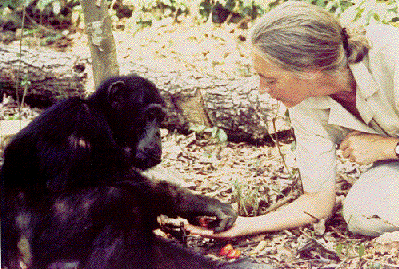

On October 22,
1998 I had the honor of attending a lecture presented by Dr. Jane Goodall.
This experience, for me, was something I will always chesrish and never
ever
forget.
I can promise that this sole individual will always hold a place
deep in my heart, my thoughts and throughout the rest of my life.
In 1957, Jane Goodall first met the famed anthropologist Dr. Louis Leakey, who later played a pivotal role in her life. With the idea of gaining insight into humans' evolutionary past, Dr. Leakey proposed a pioneering long-term field study on wild chimpanzees. Even though Jane had no formal training, her patience and persistent desire to understand animals led him to choose her for the study. Although it was unheard of for a woman to venture into the wilds of Africa, going there meant the fulfillment of her childhood dream. In the summer of 1960 she arrived in Tanzania on Lake Tanganyika's eastern shore. This marked the beginning of the longest continuous field study of animals in their natural habitat. Five years later, she earned a Ph.D. in Ethology at Cambridge University and returned to Tanzania to establish the Gombe Stream Research Centre.
After more than thirty-five consecutive years of research, Dr. Goodall and her team continue to contribute significant findings on chimpanzee behavior and ecology. Her methodology and profound scientific discoveries revolutionized the field of primatology. For instance, Dr. Goodall distinguished between individual chimpanzee personalities, giving them names instead of numbers. She also chronicled chimpanzees making and using tools, a skill once believed exclusive to humans. To provide on going support for chimpanzee research, Dr. Goodall founded The Jane Goodall Institute in 1977.
Today, she spends
most of her time traveling around the world, lecturing on her experiences
at Gombe and speaking to school groups about Roots & Shoots, JGI's
environmental education and hummanitarian program for youth.
*her lastname is somewhat of an irony, don't ya think?*
 PLeaSe ViSiT "THe JaNe GooDaLL iNSTiTuTe" HoMePaGe
PLeaSe ViSiT "THe JaNe GooDaLL iNSTiTuTe" HoMePaGe
